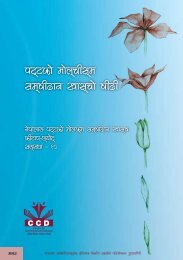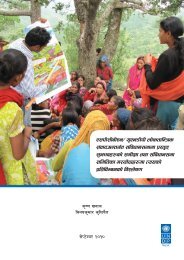The Dalits of Nepal and a New Constitution - ConstitutionNet
The Dalits of Nepal and a New Constitution - ConstitutionNet
The Dalits of Nepal and a New Constitution - ConstitutionNet
You also want an ePaper? Increase the reach of your titles
YUMPU automatically turns print PDFs into web optimized ePapers that Google loves.
<strong>The</strong> <strong>Dalits</strong> <strong>of</strong> <strong>Nepal</strong> <strong>and</strong><br />
a <strong>New</strong> <strong>Constitution</strong><br />
61<br />
poverty, unemployment, price rise, corruption, etc. <strong>The</strong> 1989<br />
Act is a salutary legislative measure in that direction.”<br />
“In our opinion, calling a member <strong>of</strong> the Scheduled Caste<br />
`Chamar’ with intent to insult or humiliate him in a place<br />
within public view is certainly an <strong>of</strong>fence under Section<br />
3(1) (x) <strong>of</strong> the Act. Whether there was intent to insult or<br />
humiliate [a person] by using the word `Chamar’ will, <strong>of</strong><br />
course, depend on the context in which it was used.”<br />
<strong>The</strong> 1990 <strong>Constitution</strong> provided for the Supreme Court <strong>of</strong><br />
<strong>Nepal</strong> to provide remedies for breaches <strong>of</strong> human rights,<br />
including by a procedure similar to the Indian PIL.<strong>The</strong><br />
following issues have arisen in public interest litigation<br />
regarding the rights <strong>of</strong> <strong>Dalits</strong> in <strong>Nepal</strong>:<br />
• Social discrimination.<br />
• Rights <strong>of</strong> dalit women, especially <strong>of</strong> Badi women.<br />
• Discrimination against dalits in connection with using<br />
public places <strong>and</strong> facilities.<br />
• Discrimination against dalits in connection with equal<br />
access to natural resources.<br />
• Discrimination in marital life.<br />
• Discrimination in the field <strong>of</strong> social, religious <strong>and</strong><br />
traditional practices.<br />
• <strong>The</strong> need for effective legal framework against the<br />
discrimination against <strong>Dalits</strong>.<br />
• Discrimination in connection with the place <strong>of</strong> residence<br />
(denial <strong>of</strong> residence on the basis <strong>of</strong> one belonging to<br />
the Dalit community).<br />
Enforcement <strong>of</strong> Rights <strong>of</strong> <strong>Dalits</strong><br />
through Directive Principles <strong>of</strong><br />
State Policy<br />
Directive principles <strong>of</strong> state policy are provisions which<br />
are not enforceable in any court, but seek to direct the<br />
state towards attaining certain values that are considered<br />
necessary in society 65 . One <strong>of</strong> such values is the<br />
elimination <strong>of</strong> all kinds <strong>of</strong> socio-economic <strong>and</strong> political<br />
discrimination operating. It is the responsibility <strong>of</strong> the<br />
government to uphold these directive principles <strong>of</strong> state<br />
policy in every field, <strong>and</strong> the judiciary should seek to<br />
implement them wherever it is possible. As will be seen<br />
in the cases below, the Supreme Court has time <strong>and</strong><br />
again emphasized the importance <strong>of</strong> directive principles<br />
<strong>of</strong> state policy in bringing about equality among the<br />
citizens.<br />
Some Cases regarding Rights <strong>of</strong><br />
<strong>Dalits</strong> before the Supreme Court<br />
Reservation in Medical Studies under T. U. for <strong>Dalits</strong>, women<br />
<strong>and</strong> other backward classes :<br />
It was decided by Tribhuvan University that for M.B.B.S <strong>and</strong><br />
other medical studies, a reservation <strong>of</strong> 45% was necessary<br />
for <strong>Dalits</strong>, women <strong>and</strong> other backward classes (such that,<br />
10% to dalits, 15% to other backward classes <strong>and</strong> 20% to<br />
women) <strong>and</strong> the remaining 55% was to be open for general<br />
competition. This was challenged on the basis that it was<br />
against the right to equality incorporated in the <strong>Constitution</strong><br />
<strong>and</strong> was thus against Article 11, 12 <strong>and</strong> 16 <strong>of</strong> the<br />
constitution.<br />
<strong>The</strong> court decided that although the reservation <strong>of</strong> medical<br />
seats was aimed at bringing substantive equality among<br />
the citizens, it could not be considered valid, because<br />
according to Article 11 (3) <strong>and</strong> 24 (2) <strong>of</strong> the 1990<br />
<strong>Constitution</strong> it was necessary to first pass legislation before<br />
reservation could be declared.<br />
However, the court directed the government to pass<br />
legislation in this field keeping in mind the Directive<br />
Principles <strong>of</strong> State Policy.<br />
Case: Praddosh Chhetri vs. HMG/<strong>Nepal</strong>, NKP 2061, Vol. 7,<br />
p. 901.<br />
Discrimination in Public Water Sources:<br />
Public interest litigation was filed seeking the abolition <strong>of</strong><br />
separate public water sources for different castes, <strong>and</strong> the<br />
recognition <strong>of</strong> their right to access water from such sources,<br />
on the basis that discrimination was against the right to<br />
equality under Article 11 <strong>of</strong> the constitution. It was also<br />
against Article 26 (2) <strong>of</strong> the constitution which dealt with<br />
Directive Principles <strong>of</strong> State Policy, which sought to<br />
strengthen social relations among the various communities.<br />
65<br />
See Appendices 2 <strong>and</strong> 3.


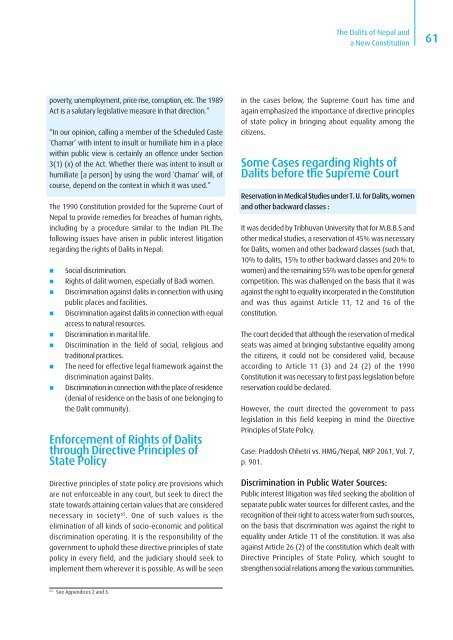

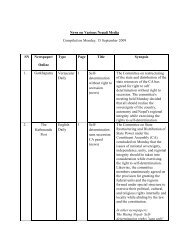

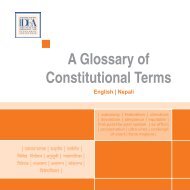
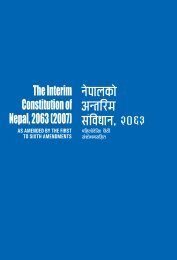
![g]k fnsf blntx? / gofF ;+l jwfg](https://img.yumpu.com/49483602/1/184x260/gk-fnsf-blntx-goff-l-jwfg.jpg?quality=85)
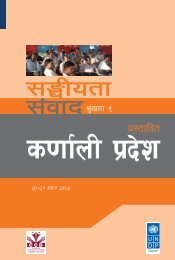

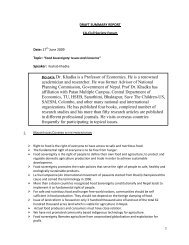
![+ljwfg;ef, /fHosf]k'g](https://img.yumpu.com/41604075/1/184x260/-ljwfgef-fhosfkg.jpg?quality=85)
